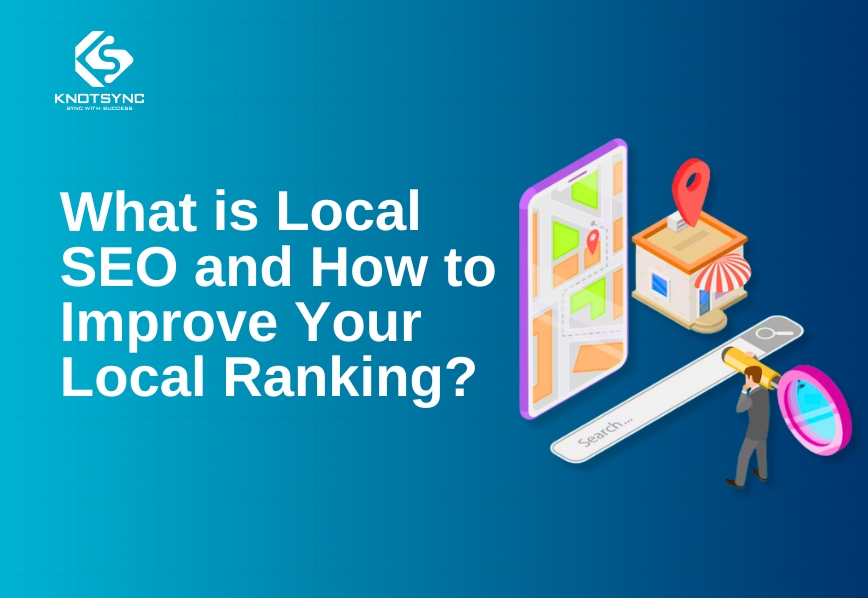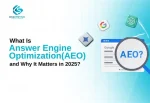Imagine you run a successful bakery in your neighbourhood. But when people search for a bakery nearby on Google, your business doesn’t show up. Just like that, potential customers walk past your shop or worse, find your competitor.
So, how do you make sure that your business shows up on local searches? The answer is simple: “Local SEO.” But what is local SEO, and how does it work?
Don’t worry if you have not heard about it. In this blog post, we’ll tell you everything you need to know about local SEO so you can run your business successfully and attract local customers.
So, without further ado, let’s jump right in.
What is Local SEO?
Local SEO is a branch of SEO that helps local businesses optimize their websites and increase their search visibility, so they appear on SERPs in their area.
For example, it helps local businesses to be seen by potential customers who search for one specific location, such as “Best restaurant in Texas,” “Coffee shop near me,” or “Bakery near me.”
If your business appears in these searches, then there might be chances that you can get more customers, 76% of consumers who search for “near me” visit that business within a day.
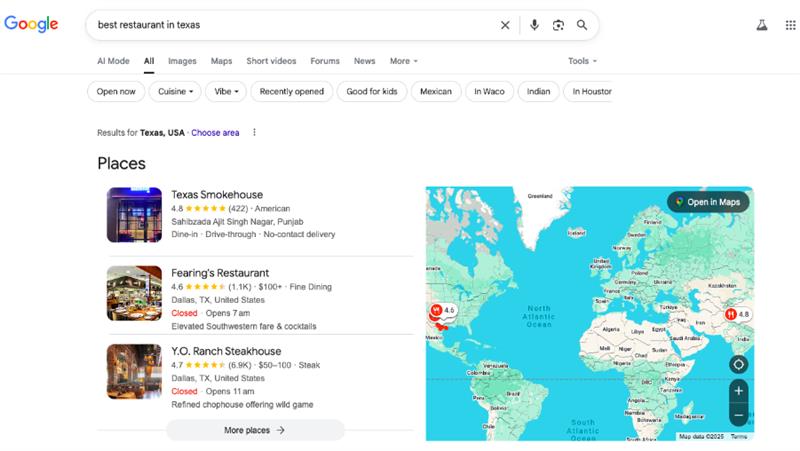
What is the Different Between Traditional SEO and Local SEO?
Local SEO is an incredibly effective strategy that relies on advertising your brand, products, and services to local leads and customers. It is more specific to a certain location compared to general Google searches. That is why it is essential for smaller businesses that operate on a regional level instead of a national level.
But you might be wondering how local SEO differs from general SEO in terms of ranking factors.
Well, let’s look at the difference between traditional SEO and local SEO so that you can understand it better.
| Factors | Traditional SEO | Local SEO |
| Goal | Focus is on ranking for industry-wide terms and competing nationally or internationally. | Attract nearby customers and drive more local leads or visits. |
| Keywords | Broad, generic keywords like “best coffee” or “SEO agency.” | Location-specific terms including city or neighbourhood like “best coffee in Austin” or “SEO agency near me.” |
| Listings | Usually just your website shows up. | Google Business Profile, maps, local directories like Yelp, TripAdvisor, etc. |
| Backlinks | Links from big websites or blogs in your industry. | From local websites, newspapers, blogs, and business partners. |
| Content Focus | Broad topics that interest a wide audience. | Localized content: city guides, events, news, and local case studies. |
| Reviews & Reputation | Optional or industry-based recognition. | Very important. Google reviews and ratings affect rankings a lot. |
| User Intent | Often research-focused or general interest. | People are ready to visit, call, or buy locally. |
| Metrics | Organic traffic, keyword rankings, domain authority. | Local pack rankings, Google Maps visibility, calls, clicks for directions, foot traffic. |
| Competition | National or global competitors with broader reach. | Nearby local businesses targeting the same audience as you. |
Keeping these differences in mind, you can see how traditional SEO is different from local SEO and how it can make a big difference for your business. Let’s move further with why it is important.
Why is Local SEO Important?
Did you know that 46% of all Google searches are local? This means that people use Google to search for businesses near them, making local SEO crucial for your business. It also helps you:
- Boost your online visibility.
- Show up on the internet map for future customers to see.
- Reach out to local customers who search for local businesses.
- Bring in more foot traffic to your actual location.
- Attract more targeted traffic, which brings more leads and improves your chances of conversion.
- Enhance your credibility and build trust.
Local businesses must use local SEO as:
- Local search has the highest conversion rate among all local advertising channels.
- More local customers use mobile phones or tablets to find the best local businesses.
- Local SEO is a great return on investment.
The power of local SEO doesn’t stop with small businesses. Big companies with lots of branches can also see huge benefits when they optimize each location separately.
In fact, a nationwide brand can show up in local searches across different cities, and even dominate those results, by giving each branch its own local SEO strategy.
How Google Determines Local Rankings?
When you or someone types “pizza near me” or “best dentist in Boston,” how does Google decide which businesses show up at the top? The answer lies in Google’s local search ranking factors.
Google has confirmed that it looks at three main signals when ranking local businesses:
1. Relevance
Relevance is about how well a local business listing matches what someone is searching for. If you’re a bakery but your Google Business Profile only says “shop,” Google may not connect you with a search for “wedding cakes near me.”
It’s important that you make sure that all the information in your profile is accurate and matches your business.
How to improve the relevance factor:
- Add complete business details (categories, services, products, attributes).
- Use relevant keywords in your business description.
- Create content that aligns with your customers’ search intent (e.g., “best gluten-free cakes in Austin”).
2. Distance
Distance refers to how close your business is to the person conducting the search. For example, if someone searches “plumber near me” in Dallas, Google will prioritize plumbers located closest to that searcher.
Important note: You can’t control where people are searching from, but you can optimize your business for multiple locations with local landing pages and service area settings.
3. Prominence
Prominence is about how well-known and trusted your business is. Google measures this by looking at:
- Reviews: More positive reviews = higher trust.
- Citations: Mentions of your business across directories.
- Backlinks: Links from reputable local websites.
- Overall reputation: News coverage, blogs, online discussions.
A small, local shop with lots of reviews, strong citations, and backlinks may outrank a bigger business with a weaker local presence.
In addition to these factors, Google loves activity, which means regularly updating your profile, adding posts or photos, and responding to reviews consistently.
How to Improve Local Ranking?
When it comes to local SEO, there are many building blocks that work together to boost your local visibility. Think of it as running a neighbourhood shop; you need a clear sign, a great reputation, and to be easy to find.
For that, you’ll need to do the following things to improve your local ranking of your business:
1. Find Local Keywords
The first thing that you’ll need to do in your local SEO strategy is to find high-volume local keywords. Since keywords are the compass of SEO, and without the right ones, your business could show up in irrelevant searches, or not at all.
With local keywords, you can connect with people who are ready to find or hire a business in your area.
Here’s how to find the right local keywords:
- Google Keyword Planner
Google Keyword Planner is a tool that shows what people are searching for in your area, along with search volume and competition. You can type in your service (like “dentist” or “coffee shop”) and filter results by city to see which keywords matter the most locally.
- SEMrush and Ahrefs
If you want to go deeper, you can use these well-known tools, SEMrush and Ahrefs. They let you:
- Discover the keywords your competitors are ranking on.
- Check keyword difficulty scores (how hard it is to rank for a keyword).
- Find long-tail variations (more specific searches with less competition).
They have both paid and free versions. The free options are handy for basic research, but if you want to get into competitor insights or detailed keyword data, the paid plans give you a lot more to work with.
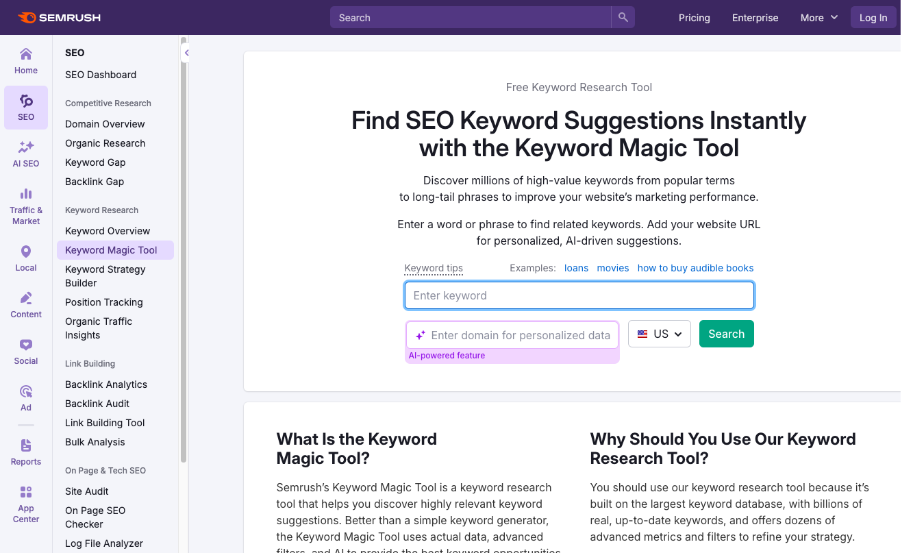
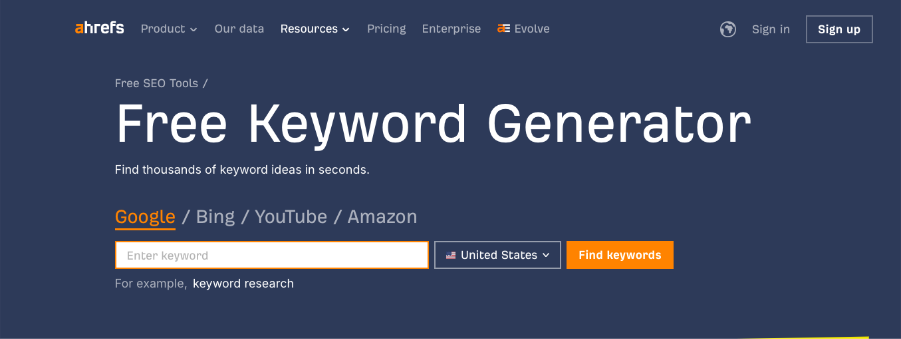
- Look for “Near Me” Terms
Do you know that over 1.5 million searches each month include “near me”?
Phrases like “dentist near me” or “pizza near me” are extremely common in local searches. These are called geo-modified keywords, and they show Google that the person is ready to visit or buy.
Even though you’re not literally writing “near me” on every page, optimizing your business profile, website, and citations with location info makes you more likely to show up for these searches.
2. Optimize Your Google My Business Listing
Google My Business is perhaps the most effective way to improve your business’s local ranking in Google search local results as well as on Google Maps.
You must be wondering what Google My Business is. Let’s understand it with the help of an example. Suppose you search for “Burger joints near me,” and you find local results across Google in places like Google Maps and Search. This happens because businesses have created their own business profiles on Google My Business.
In short, Google My Business helps businesses create free business listings so that their business shows up for relevant searches in their area.
To improve your business’s local ranking, you can use Google My Business to claim and update your business information. All you need to do is:
- Add or claim your listing. You need to provide your full and correct business name, business category, office address, its exact location on a map, and your phone number and website (if applicable) for this.
- Verify your account.
- Update your business details like opening hours, the product or service you sell, and additional categories that may be relevant to your business.
- Link to your website.
- Upload recent images of your business.
You can also optimize your Google My Business profile by regularly sharing fresh content and business updates like product announcements, events, and exclusive offers.
3. Use Google Autocomplete to Discover Keyword Ideas
This is one of the easiest (and free) ways to uncover keyword ideas, and the best part is, you don’t need any fancy tools to do it.
Just let Google do the work for you.
- Type a phrase like “best coffee in…” and see what Google suggests.
- Those autocomplete suggestions are real searches people are making.
- Use these phrases in your website content, FAQs, or blog posts.
For example, if you type “best pizza in Chicago,” autocomplete might suggest:
- “best pizza in Chicago downtown”
- “best pizza in Chicago suburbs”
- “best pizza in the Chicago area”
Each of those is a potential blog post or service page.
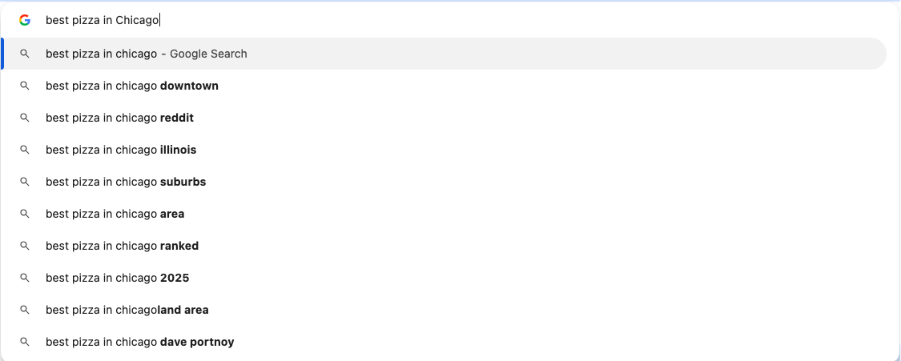
4. Ask for Reviews
After searching for a service or a product, the first thing a customer does is look at other people’s reviews and experiences. Reviews are the new word-of-mouth.
But do you know that Google also uses reviews as a ranking factor?
Positive reviews can improve your business visibility, improve your reputation, and encourage more local customers to buy from you.
Here’s how reviews affect SEO:
- Quantity: More reviews = more trust.
- Quality: Higher ratings improve your reputation.
- Recency: Fresh reviews carry more weight than old ones.
Tips for managing reviews:
- Politely ask your happy customers to leave feedback. A simple “Would you mind leaving us a review on Google?” goes a long way.
- Use QR codes on receipts or menus to make it easy for people to review you.
- Never buy fake reviews. Google can detect them, and it may hurt your rankings.
Once you get reviews, positive or negative, respond sincerely to them. Even when the review is negative, you can address the problem calmly. When you reply to reviews, it shows that you value your customers and their feedback.
Not only will positive reviews help you rank better, but they also help others see that your business is highly recommended, which increases your chances of gaining new customers.
5. Focus on Link Building
Link building is an important factor that influences your ranking in local searches. That is why it is given priority whenever you do local SEO. Think of these links as a digital referral; when another site links to you, it’s like saying, “We trust this business.”
Earning links from websites with high domain authority in your local area will give your business an advantage over your competitors.
Instead of chasing random links, focus on building strong local connections. Only target authority websites in your region so that the linking domains are more relevant to your target location.
Here’s how you can do it:
- Partner with Local Businesses: Team up with nearby companies and link to each other. For example, a gym and a smoothie bar are cross-promoting on their websites.
- Sponsor Community Events: Support a youth team, charity run, or festival. These groups often list sponsors with backlinks.
- Get Local Media Coverage: Share newsworthy updates (like events or new services) with local newspapers or magazines, which often include links.
- Join Associations: Chambers of commerce and trade groups usually list members in online directories with links.
- Create Link-Worthy Content: Publish guides, infographics, or blogs about local sports and events. People naturally share and link to content that’s useful.
6. Ensure Your Business NAP is Consistent
For search engines to show your business when the searcher searches, your business NAP (name, address, and phone number) remains consistent across all platforms and websites.
Search engines like Google, Bing, Yelp, and other directories use your NAP details to verify that your business is real and trustworthy.
Why consistency matters:
- If your business is listed as “Mike’s Pizza Shop” on Google, but “Mike’s Pizzeria” on Yelp, Google might think they’re two different businesses.
- Confusing or mismatched information can hurt your chances of ranking in local searches.
- Consistent NAP signals trust, which is a ranking factor for local search and Google Maps.
Best practices for NAP consistency:
Consistent NAP is important for both the local listing rankings and local organic rankings. Here is what to do to maintain that:
- Choose One Format and Stick To It: Example: “123 Main St., Suite 200” vs. “123 Main Street #200.” Pick one and use it everywhere.
- Audit All Listings: Check platforms like Google Business Profile, Yelp, Facebook, Yellow Pages, TripAdvisor, Bing Places, Apple Maps, and industry-specific directories.
- Update Immediately When Details Change: Moved to a new office? Changed phone number? Update across all listings ASAP. Even one outdated listing can confuse both search engines and customers.
- Don’t Forget Your Website: Your NAP details should be visible on your Contact Us page and in your website footer.
The easier you make it for Google to recognize your business info, the higher your chances of showing up in local results.
7. Use Influencer Marketing for Your Branding
Influencer marketing isn’t just for big brands; it works wonders for local businesses too. Local creators and community figures already have the trust of people in your city, and collaborating with them can quickly boost your visibility and credibility.
Partnering with them can put your business directly in front of the right audience. Here’s why influencer marketing matters in local SEO:
- Local influencers (like food bloggers, lifestyle creators, or community figures on Instagram/TikTok) often have a loyal following in your city.
- When they talk about your business and link to your website, you get:
- A local backlink (good for SEO).
- More branded searches (people Googling your name after seeing you).
- Social proof that strengthens your reputation.
For example, take a food blogger like Hungryhugh who explores local vendors and shares his experience trying their food. A single feature from him can put a small restaurant on the map and attract a wave of curious locals.
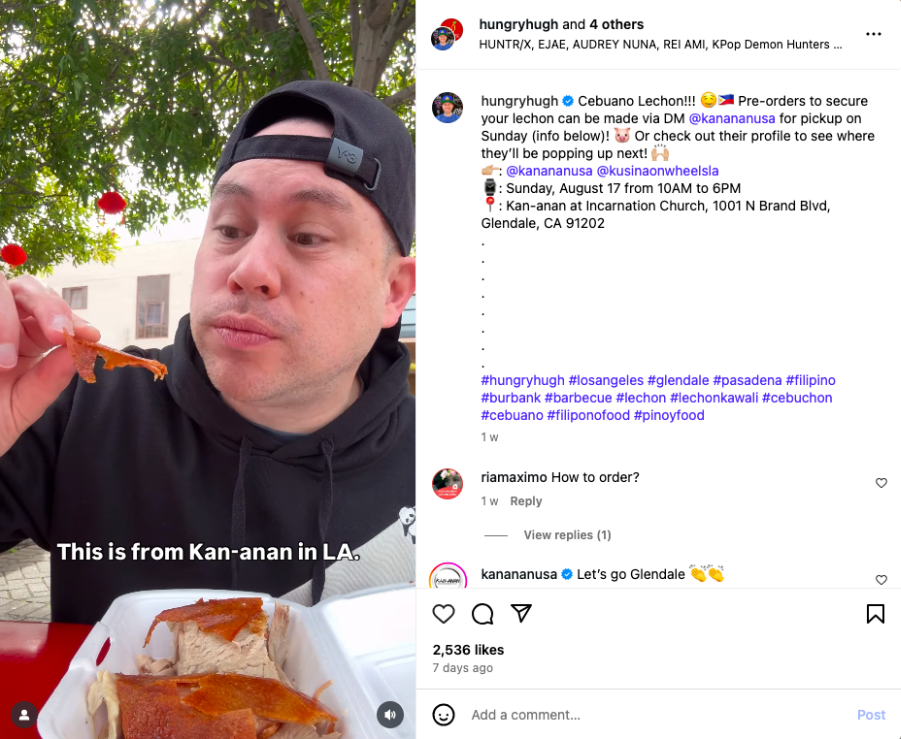
8. Use Reddit Threads
Reddit might not sound like an SEO tool at first, but it’s an underrated way to drive local awareness and even get reputable backlinks.
Think of Reddit as a giant collection of online communities. Many cities, towns, and neighbourhoods have their own dedicated subreddits (like r/Chicago, r/Seattle, or r/LosAngeles).
These spaces are full of people asking for local recommendations, such as restaurants, plumbers, gyms, cafes, you name it. If your business shows up in those conversations, it’s like modern-day word-of-mouth.
Why it helps:
- Reddit posts often rank in Google search results themselves. If someone searches “best coffee in Denver,” they might land on a Reddit thread where your cafe is mentioned.
- Participating in local Reddit communities (like r/LosAngeles, r/Boston, or niche city-specific subreddits) helps you engage with locals authentically.
- If people recommend your business in these threads, it creates brand mentions and sometimes even natural backlinks.
How to Use Reddit for Local SEO:
- Join your city or neighborhood subreddit.
- Be helpful, answer questions, give recommendations, and share tips. Don’t just promote.
- When appropriate, mention your business naturally (e.g., “We run a small coffee shop downtown, and one thing we always recommend is…”).
- Track mentions of your business; positive threads can bring long-term traffic because Reddit posts often stay visible in search results for years.
9. Monitor Your Progress and Ranking
Local SEO isn’t “set it and forget it.” It’s an ongoing process. You need to track your progress and keep improving.
Here’s how to monitor your results:
- Google Business Profile Insights: See how people find your listing, what they search, and what actions they take.
- Google Analytics: Track how much of your traffic comes from local searches, and which pages bring in the most customers.
- Local rank trackers (BrightLocal, Moz Local): These show where you rank for specific keywords in specific locations.
By checking your progress regularly, you’ll know whether your strategies are working or if you need to adjust your plan.
Frequently Asked Questions (FAQs)
Although we’ve explained local SEO in detail in the above section, here are some of the common questions asked by people on this topic. This way, you can get straight to the point and find exactly what you’re looking for.
1. How to increase Google ranking for free?
The easiest free way is to claim and complete your Google Business Profile, use local keywords, and ask happy customers to leave reviews. Posting local content and making sure your site is mobile-friendly also helps boost your ranking without spending a cent.
2. What future trends should local businesses focus on to stay ahead in local SEO?
It’s smart to get ready for voice searches like “best pizza near me,” since more people use smart speakers and phones this way.
Also, focus on short videos and hyper-local keywords (like your neighborhood name), and keep your Google Business Profile active because Google is leaning heavily on AI and rich results.
3. How long does it take to see results from Local SEO?
You usually start noticing results in about 3–6 months, but it can take longer in competitive areas. The key is consistency; keep updating your profile, collecting reviews, and posting local content, and your visibility will keep improving over time.
Conclusion
To sum up, we can say that local SEO is an important element that can help your local business grow. So, take advantage of local SEO strategies to boost your sales, enhance your online visibility in local searches, and grow your business. Get started today with the help of a professional SEO services provider.
Don’t forget to tell us in the comments section which strategy you will be using to improve your local ranking.


